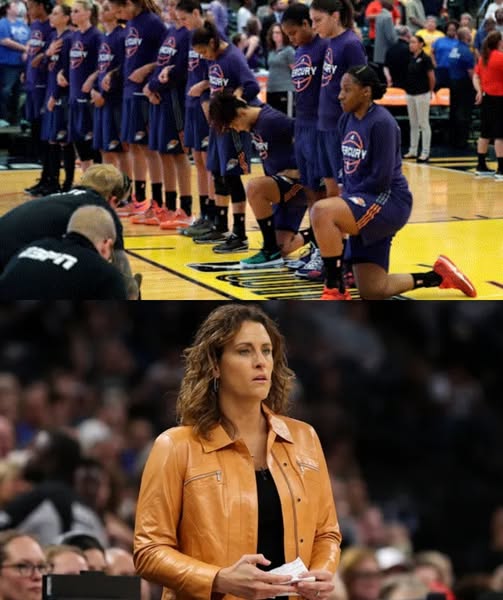In a controversial incident that has reignited the debate over political protests in sports, two WNBA players were immediately disqualified for kneeling during the national anthem at a flag ceremony. The decision has sparked mixed reactions, with some supporting the players’ right to protest while others argue that politics should be kept out of sports.
WNBA Players Ejected for National Anthem Protest
The incident took place just before tipoff when the two players—whose names have not been officially disclosed—took a knee as the national anthem played during the ceremonial honoring of the American flag. Officials swiftly intervened, citing league rules regarding player conduct during pre-game ceremonies, leading to their immediate disqualification from the game.
Reports indicate that the WNBA’s stance on anthem protests has varied in recent years, with some teams and players openly participating in social justice demonstrations, while others have chosen to stand in solidarity with the anthem.
League Officials Defend Disqualification Decision
Following the incident, the WNBA released a statement clarifying its position. According to league officials, the disqualification was not about silencing political expression, but rather a strict enforcement of pre-game conduct rules that players are expected to follow.
“While the WNBA supports freedom of expression, all players are required to adhere to game-day protocols, including standing during the national anthem as part of the flag ceremony,” the statement read.
The decision to eject the players has led to widespread debate about the intersection of sports and activism, with many questioning whether athletes should face penalties for peaceful protests.
Mixed Reactions from Fans and Fellow Players
The disqualification has been met with a wave of reactions from across the sports community. Some fans and analysts argue that the league’s decision was justified, emphasizing that professional sports events should remain apolitical. Others believe the players were simply exercising their First Amendment rights and should not have been penalized for their peaceful demonstration.
Several WNBA players and coaches have spoken out in support of the ejected athletes, with some calling for a review of the league’s policies on anthem protests. One former WNBA star posted on social media:
“Players should not have to choose between their careers and standing up for what they believe in.”
Conversely, some fans expressed frustration, arguing that sports should be a place of unity rather than political division.
Kneeling in Sports: A Recurring Controversy
This is not the first time anthem protests have caused controversy in professional sports. The debate dates back to Colin Kaepernick’s 2016 protest in the NFL, which led to a nationwide discussion about racial justice, patriotism, and free speech in sports.
Over the years, leagues such as the NBA, NFL, and MLB have adjusted their policies, sometimes allowing players to kneel, while others have strictly enforced anthem conduct rules—as seen in the WNBA’s latest decision.
Will the WNBA Reevaluate Its Policies?
Following public backlash, there is growing speculation that the WNBA may reconsider its stance on anthem protests. Some sources claim that league officials are discussing potential policy revisions, while others believe the league will maintain its zero-tolerance stance on disruptions during flag ceremonies.
If the WNBA decides to soften its approach, it could align more closely with other major sports leagues that have chosen to allow peaceful protests. However, doing so could also alienate certain fans and sponsors who prefer strict anthem protocols.
Final Thoughts: The Future of Political Protests in Sports
The ejection of two WNBA players for kneeling during the national anthem has once again highlighted the ongoing tension between athletic professionalism and activism.
As sports continue to be a platform for social and political discourse, the question remains: Should leagues enforce strict conduct rules, or should they allow players the freedom to express their beliefs?
With fans, athletes, and analysts divided, this incident may prompt further discussions on whether sports should be a platform for protest or a space reserved solely for competition.
